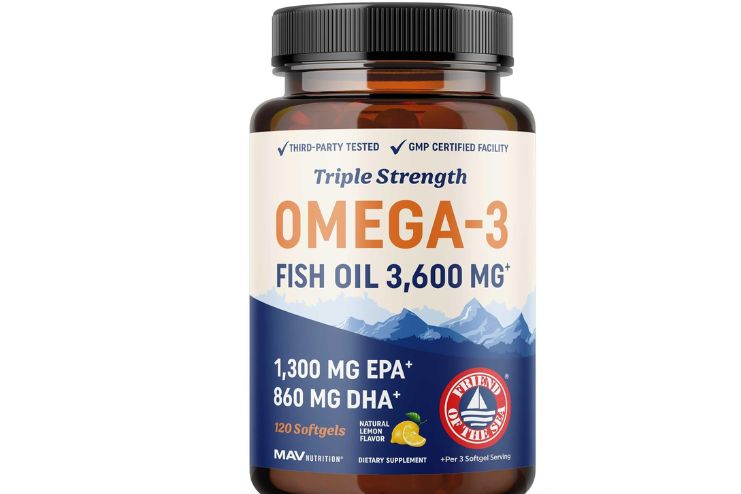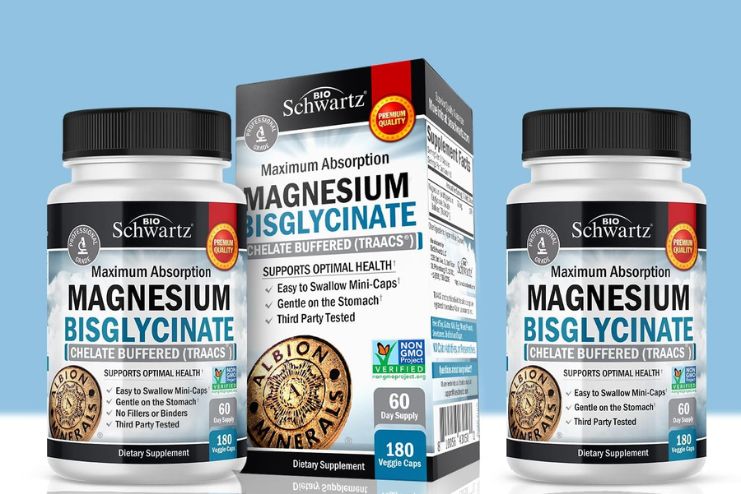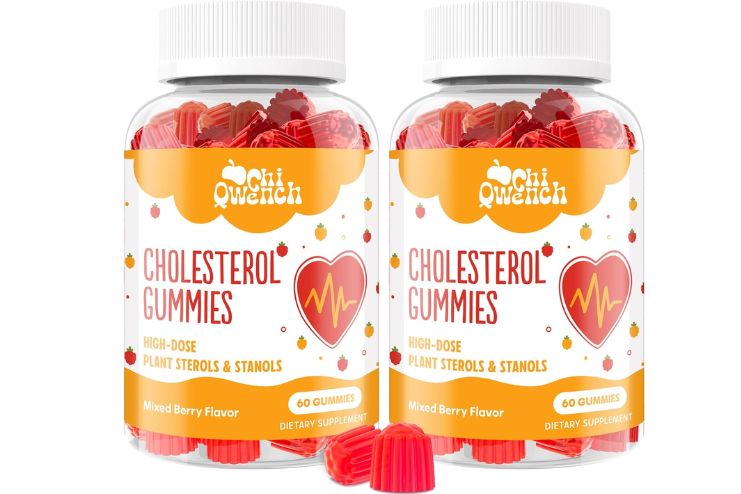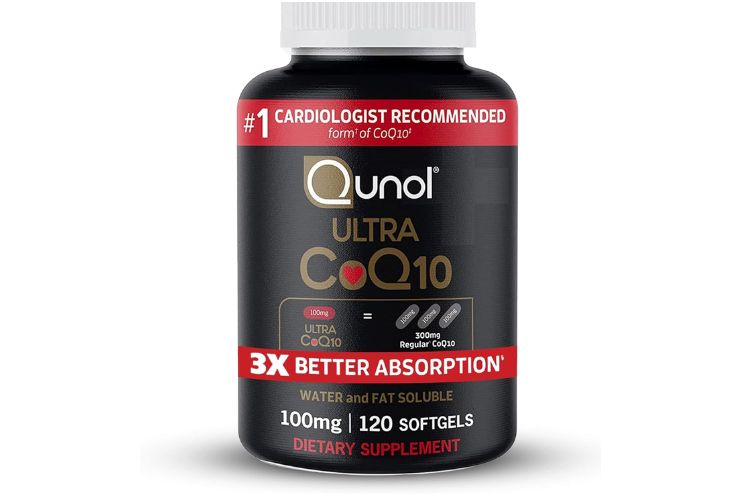AI Contribution
At HealthSpectra, we may use AI to refine grammar and structure, but every piece is shaped, checked, and approved by real people, our expert writers and editors, to ensure clarity, credibility, and care. Learn more..Affiliate Disclaimer
Some links in this article are affiliate links. We may earn a small commission if you make a purchase through these links, at no extra cost to you. We only recommend products we find useful to our readersSustaining excellent cardiac health is essential, and controlling cholesterol levels is a vital part of that. Elevated cholesterol can lead to major cardiovascular problems like heart disease and stroke.
You can significantly lower your risk of developing these potentially fatal illnesses by being aware of and proactive about your cholesterol levels.
Vitamins and minerals play a crucial role in maintaining heart health as they help with blood pressure regulation, inflammation prevention, and supporting cardiovascular function, among other benefits.
A balanced diet with essential minerals such as potassium, magnesium, vitamin K, and vitamin D can help lower the risk of heart-related illnesses and improve heart health. Recognizing the importance of these nutrients is key to preserving both general and heart health.
Let’s review the top vitamins and minerals that support heart health.
1. Vitamin D

Known as the “sunshine vitamin,” vitamin D is an essential nutrient that supports several body processes. Its principal function is to facilitate the absorption of phosphorus and calcium, which are necessary for healthy bones and teeth. Vitamin D is also crucial for maintaining healthy muscles, emotional well-being, and a strong immune system.
Studies Relating Low Levels of Vitamin D to Cholesterol
Recent studies suggest that there may be a connection between low levels of vitamin D and high cholesterol levels (R). There is a correlation between low vitamin D levels and lower levels of HDL (high-density lipoprotein), also known as “good” cholesterol, as well as higher levels of LDL (low-density lipoprotein), known as “bad” cholesterol.
This imbalance in cholesterol levels may increase the risk of cardiovascular disease and other cardiovascular disorders.
Sources and Recommended Daily Dose of Vitamin D
A number of factors influence the amount of vitamin D that should be consumed daily, including age, gender, and general health.
Adults typically require between 600 and 800 international units (IU) of vitamin D daily (R). However, higher dosages may be recommended for specific individuals, such as older adults or those who have not been exposed to the sun for a significant amount of time.
Various sources, including exposure to sunlight, fortified foods such as milk and orange juice, egg yolks, fatty fish like salmon and tuna, and dietary supplements, provide access to vitamin D.
Possible Dangers and Things to Think About
Vitamin D is generally considered to do more good than harm; however, excessive intake can lead to complications, including nausea, vomiting, malaise, and kidney problems. Therefore, supplementation should be controlled and kept within the limits recommended by a qualified medical professional.
In addition, those on certain medications and with certain medical conditions must proceed with utmost caution in using vitamin D supplements, as it may aggravate pre-existing health conditions or interact with their other medications.
Consulting a healthcare professional and periodic monitoring of one’s vitamin D status can be a way of minimizing the risks associated with vitamin D and facilitating positive outcomes for your health.
Buy Amazon Basics Vitamin D3 2000 IU Gummies
Also, Read: The Interplay of Vitamin D Deficiency and Diabetes Risk
2. Omega-3 Fatty Acids

Omega-3 fatty acids are said to be one of the essential nutrients, the most well-defined benefits of which one can think of being doing wonders for the heart (R). Not only do omega-3 fatty acids play a role in blood pressure regulation, inflammation decrease, and the prevention of clot formation, but they also help keep our cardiovascular system healthy.
Therefore, incorporating omega-3 into the diet would generally help reduce the likelihood of heart disease and stroke.
EPA and DHA Are Two Types of Omega-3 Fatty Acids
The usual two types of omega-3 fatty acids found in fish oil are docosahexaenoic acid (DHA) and eicosapentaenoic acid (EPA). These fatty acids significantly affect the cardiovascular system and have very high bioavailability. While DHA supports brain health and cognitive function, EPA reduces inflammation and contributes to the smooth functioning of blood vessels.
Advantages of Controlling Cholesterol
Omega-3 fatty acids act therapeutically by lowering triglycerides, reducing LDL cholesterol (the “bad” cholesterol), and raising HDL cholesterol (the “good” cholesterol). The risk of developing cardiovascular diseases, such as atherosclerosis and other heart ailments, is significantly lowered by the combined effects of these omega-3 fatty acids (R), which help maintain a healthy balance of these lipids in the bloodstream.
Sources from Diet and Possibilities for Supplements
Salmon, mackerel, sardines, and trout are all oily fish that contain a wealth of omega-3 fatty acids. There are also good plant sources such as flaxseeds, hemp seeds, and walnuts. Those who find their intake of omega-3-rich foods too low may consume fish oil or algal oil capsules.
Selecting supplements from a trustworthy company will go a long way in guaranteeing the benefits of omega-3 fatty acids without compromising exposure to contaminants.
Buy Triple Strength Omega 3 Fish Oil 3600 mg
Also, Read: Savory Heart-Healthy Salmon Salad: A Nutritious Omega-3 Boost
3. Vitamin B Complex

The B vitamins, sometimes called the vitamin B complex, are a class of water-soluble vitamins vital for many different bodily processes (R). Although each B vitamin has a distinct purpose, they frequently complement one another. Among other essential functions, B vitamins aid in the creation of red blood cells, support the neurological system, contribute to energy metabolism, and play a role in DNA synthesis.
B Vitamins’ Function in The Metabolism of Cholesterol
Several B vitamins affect cholesterol metabolism. These B vitamins include B3 (niacin), B6 (pyridoxine), B9 (folate), and B12 (cobalamin). Niacin, for example, is effective in reducing LDL cholesterol (“bad” cholesterol) and increasing HDL cholesterol (“good” cholesterol).
Vitamin B6 plays a role in transforming homocysteine (R), a chemical linked to cardiovascular disease, into other compounds that are beneficial to the body. Folate and vitamin B12 are additional components essential for the breakdown of homocysteine.
Suggested Daily Consumption and Food Sources
The amount of B vitamins recommended for daily consumption varies depending on factors such as age, gender, and overall health. To maintain optimal health, it is important to consume adequate amounts of each B vitamin.
Foods high in B vitamins include legumes, nuts, seeds, and leafy green vegetables. Whole grains, meat, poultry, fish, eggs, and dairy products also fall into this category. Eating a well-balanced diet that includes a variety of these foods is one way to ensure you are getting enough of the B vitamins.
Supplementary Considerations
Even though it is generally recommended to obtain nutrients from food, specific individuals may require supplements to fulfill their B vitamin requirements if their diet needs improvement.
Supplementing with B vitamins may be advantageous for certain groups of people, such as the elderly, vegetarians, vegans, and women who are pregnant or nursing an infant. Certain groups may have increased requirements for specific B vitamins.
Before beginning any supplementation routine, speaking with a healthcare provider is crucial because taking too many B vitamins might have adverse effects. Personalized guidance is advised because certain medical conditions and drugs may also impact the body’s capacity to absorb or utilize B vitamins.
Selecting premium supplements from reliable companies and adhering to suggested dosage recommendations are crucial for safety and efficacy.
Buy Naturelo Vitamin B Complex
Also, Read: Vitamin B12 Benefits And Side Effects
4. Magnesium

Magnesium is a vital mineral necessary for maintaining heart health (R). It is a component of more than 300 metabolic processes in the body, including blood pressure regulation, heart rhythm maintenance, and nerve and muscle support (R). Heart attacks, strokes, and arrhythmias are among the cardiovascular disorders linked to a lower magnesium intake.
How Magnesium Affects Cholesterol Levels
New evidence shows that magnesium raises HDL and lowers concentrations of both LDL and triglycerides in blood serum (R), which also reduces cholesterol levels. It improves cardiovascular health through blood vessel function and the regulation of inflammation.
However, further study is required to determine the precise biochemical modes by which magnesium affects cholesterol metabolism.
Guidelines for Dietary Sources and Supplements
Magnesium is found abundantly in several foods such as nuts, seeds, whole grains, legumes, and leafy green vegetables. Seafood is also a source. By incorporating all these kinds of foods into the diet, you can ensure adequate magnesium intake.
Generally, the magnesium intake levels are defined between 300 and 400 mg per day in adults (R), but specific recommendations vary with age and sex, as well as with individual health conditions.
Supplements can also be recommended for those people who fail to meet their required dietary needs or have health conditions that affect the absorption or excretion of magnesium. It is important to choose a high-quality magnesium supplement and maintain the dosing guidelines to lower its side effects.
Possible Adverse Reactions and Interactions
It is generally safe for most people to consume magnesium when it is taken in appropriate quantities. Nevertheless, consuming an excessive amount of magnesium can result in adverse effects such as nausea, diarrhea, and cramping in the abdominal region.
Furthermore, there is a possibility that magnesium supplements will interact negatively with a variety of prescription medications, including antibiotics, diuretics, drugs for heart problems or diabetes, and other medications.
A consultation with a healthcare provider is essential before initiating magnesium supplementation, especially if you are currently taking medication or have any pre-existing medical issues. Magnesium consumption must be checked and adjusted frequently to ensure the best possible health outcomes.
Buy Maximum Absorption Magnesium Bisglycinate Capsules
Also, Read: Magnesium Deficiency: The Silent Problem You Didn’t Know You Had And How to Fix
5. Plant Sterols and Stanols

Plant sterols and stanols are, in fact, nature’s own, occurring in plants and in fruits, vegetables, nuts, seeds, and grains (R). Plants to which these substances relate bear a resemblance in structure to cholesterol and are considered to have characteristics that reduce cholesterol levels.
Cholesterol-Lowering Mechanism of Action
Sterols and stanols derived from plants perform their function by partially inhibiting the absorption of cholesterol from food in the intestines. They do this by competing with cholesterol for absorption sites, which reduces the amount of cholesterol that enters the bloodstream.
Consequently, there is a possibility that the levels of LDL cholesterol, sometimes known as “bad” cholesterol, in the blood will decrease, thereby reducing the likelihood of developing cardiovascular disease.
Food Supplies and Goods with Added Nutrients
Sterols and stanols derived from plants can accomplish their function by partially inhibiting the intestines’ ability to absorb cholesterol from food. They do this by competing with cholesterol for absorption sites, which ultimately leads to a reduction in the amount of cholesterol absorbed into the bloodstream.
As a result, LDL cholesterol levels, commonly referred to as “bad” cholesterol, may decrease, thereby reducing the likelihood of cardiovascular disease.
Supplementary Considerations
Dietary sources of plant sterols and stanols exist; nevertheless, plant sterol- or stanol-fortified supplements can be considered by those who have difficulty meeting the daily intake or who want better efficacy for cholesterol-lowering effects. These supplements should be used alongside other heart-healthy activities, such as daily exercise and a diet high in fruits, vegetables, whole grains, and lean protein.
It is advisable to consult a healthcare professional before beginning supplementation, especially if medications are being used or there are underlying health conditions. Regular blood cholesterol measurements and general health check-ups will also help evaluate the effectiveness and safety of plant sterol and stanol supplements.
Buy Cholesterol Supplements with 1500 Mg Plant Sterols & Stanols
6. Coenzyme Q10 (CoQ10)

Coenzyme Q10, a natural substance in all human cells, is essential for energy production in the mitochondria, the energy powerhouses of cells (R). It is particularly abundant in organs that require high energy, such as the heart. As a potent antioxidant, CoQ10 helps neutralize harmful free radicals that damage cells while supporting cardiovascular health by maintaining normal heart function and energy metabolism.
Advantages of Controlling Cholesterol
Several studies have been conducted to investigate the potential benefits of CoQ10 in regulating cholesterol levels. Some findings suggest that taking a CoQ10 supplement may help improve the overall balance of cholesterol in the bloodstream by reducing levels of LDL cholesterol (“bad” cholesterol) and increasing levels of HDL cholesterol (“good” cholesterol) (R).
Additionally, the antioxidant properties of CoQ10 may protect LDL cholesterol from oxidation, which is a critical step in the progression of atherosclerosis.
Food Sources and Possibilities for Supplements
Certain foods provide CoQ10, although the body can also produce it independently. These foods include organ meats (such as liver and heart), whole grains, nuts, seeds, and oily fish (such as salmon and mackerel). It’s important to note that the amount of CoQ10 obtained from dietary sources may be more limited compared to the quantity achievable through supplementation.
CoQ10 supplements are widely used to support heart health and overall well-being. They are available in various forms, including chewable tablets, soft gels, and capsules.
Safety Factors and Possible Adverse Consequences
Taking CoQ10 supplements as directed by a healthcare provider is generally safe for most people. However, some individuals may experience mild side effects such as nausea, sleepiness, or a slight upset stomach. It’s important to consult a healthcare provider before starting CoQ10 supplementation, particularly if you are taking medications or have pre-existing medical conditions.
CoQ10 may interact negatively with certain medications, including blood thinners, high blood pressure medications, and chemotherapy drugs. Pregnant or breastfeeding women should exercise caution and consult a doctor before taking CoQ10. Regular health check-ups and monitoring CoQ10 levels are recommended to ensure safety and effectiveness.
Buy Qunol CoQ10 100mg Softgels
Also, Read: Women’s Heart Health: Tips for Prevention and Early Detection
Conclusion
Vitamin D, B complex vitamins, magnesium, and coenzyme Q10 are essential for heart health. These nutrients help circulatory function, cholesterol regulation, and heart disease prevention. Heart health requires a balanced diet of fruits, vegetables, whole grains, lean meats, and healthy fats.
Doctors and licensed dietitians can also advise on food, supplements, and lifestyle changes to improve heart health. I recommend you emphasize heart health by eating well and supplementing when needed. You can improve your cardiovascular health and live healthier, happier lives by eating heart-healthy foods and supplements, exercising, and managing stress.
-
Apr 2024Written by Ankita
-
May 2025Edited by Lakshmi Gayatri
References
- https://www.healthline.com/health/food-nutrition/benefits-vitamin-d#1.-Vitamin-D-may-fight-disease
- https://www.mayoclinic.org/drugs-supplements-vitamin-d/art-20363792
- https://www.medicalnewstoday.com/articles/161618
- https://ods.od.nih.gov/factsheets/VitaminD-HealthProfessional/
- https://www.mayoclinic.org/diseases-conditions/heart-disease/in-depth/omega-3/art-20045614
- https://www.ahajournals.org/doi/full/10.1161/CIRCULATIONAHA.114.015176
- https://www.mountsinai.org/health-library/special-topic/omega-3-fats-good-for-your-heart
- https://www.medicalnewstoday.com/articles/325292
- https://www.betterhealth.vic.gov.au/health/healthyliving/vitamin-b
- https://www.ncbi.nlm.nih.gov/pmc/articles/PMC9662251/
- https://www.lifeextension.com/wellness/supplements/magnesium-heart-health
- https://www.healthline.com/nutrition/magnesium-benefits
- https://www.health.harvard.edu/heart-health/magnesium-helps-the-heart-keep-its-mettle
- https://www.everydayhealth.com/atrial-fibrillation/diet/where-to-get-your-magnesium-for-healthy-heart/
- https://pubmed.ncbi.nlm.nih.gov/29793664/
- https://www.webmd.com/cholesterol-management/sterols-stanols-what-know
- https://www.bda.uk.com/resource/food-facts-plant-stanols-and-sterols.html
- https://www.verywellhealth.com/which-foods-contain-the-highest-amount-of-phytosterols-697742
- https://www.healthline.com/nutrition/coenzyme-q10
- https://www.mayoclinic.org/drugs-supplements-coenzyme-q10/art-20362602
- https://www.ncbi.nlm.nih.gov/pmc/articles/PMC6131403/
In this Article





















